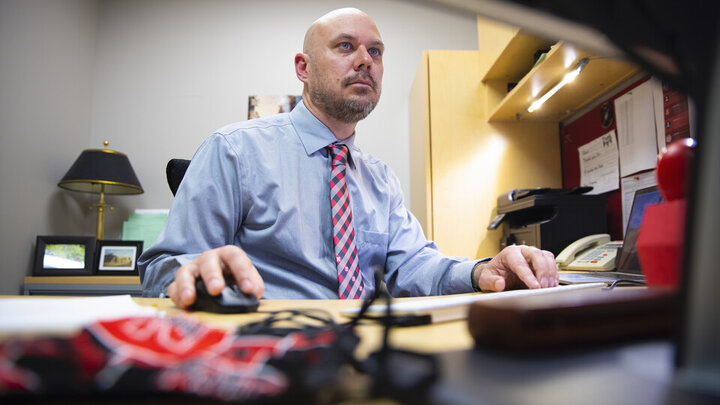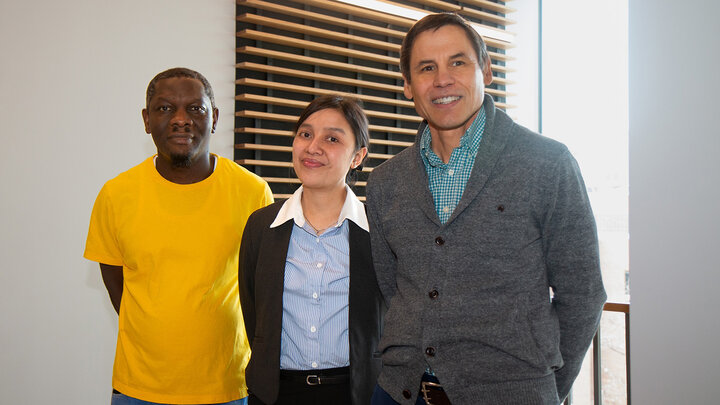In a double-wide trailer in Afghanistan, retired United States Air Force Senior Master Sergeant Mike Miller found a guidepost, leading him to his new career as an academic adviser in the University of Nebraska–Lincoln’s College of Education and Human Sciences.
As the supervisor to a group of young airmen stationed for a year there in 2012, Miller required his charges to take online courses during their deployment to further their education. Every Saturday — their day off — they made their way from the cinder-block sleeping quarters to the mess hall to eat and then spent the day completing assignments in the trailer equipped with Windows 95 computers.
“I had three guys who worked for me there,” Miller said. “That deployment was a huge opportunity to get a lot of school done because you were away from your family, and there wasn’t a lot going on. We had an internet connection, so I thought you might as well be taking classes. They worked on their bachelor’s and I worked on my master’s degree.
In the process, Miller ended up serving as a de facto academic adviser, helping navigate course registration, degree requirements and juggling homework with active duty.
“Since we were stationed overseas, they didn’t have immediate access to an adviser,” he said. “They came to me with questions, like, ‘how do we decode these requirements, and how do we figure this and that out?’ I really enjoyed working with them, answering their questions.
“And every one of them earned their degree.”
When he earned his master’s degree in business administration, Miller took a job in government contracting, but it left him feeling unfulfilled. With retirement from the Air Force on the horizon, he wondered what he’d do next.
“I didn’t have a connection with that job,” Miller said. “I was good at it, but it didn’t bring me joy and I started thinking about what I really enjoyed doing, and academic advising kind of leapt off the page at me.”
Miller decided once more to continue his education and earned a graduate certificate in academic advising and applied for the U.S. Department of Defense SkillBridge program. SkillBridge helps place retiring military service men and women into the civilian workforce by paying for up to 180 days of internship or other on-the-job training.
Miller reached out to Joe Brownell, director of the Military and Veteran Success Center at Nebraska, to see if there was a way for him to intern as an academic adviser through the program.
“It snowballed from there,” Miller said. “Joe went through the paperwork and reached out to Bill Watts (associate dean of undergraduate advising and career development) and we ended up having a meeting in person when I was visiting my parents in Lincoln.”
The hardest part of the process, Miller said, was getting the paperwork completed and deciding where Miller’s talents would fit best.
“I used some vacation time to come and shadow some people in different areas and colleges for a few days,” he said. “I liked all of them and AnnMarie (Gottner) and the advising team at CEHS really wanted to take a chance on me.”
In August 2020, Miller onboarded as an advising intern in the college and quickly had a roster of 400 students he was advising with oversight from the CEHS team.
Serendipitously, a full-time advising position opened up near the end of his internship. Miller applied, was hired, and officially began as an academic adviser in CEHS Jan. 11.
“It has been incredibly rewarding and has made my transition from military to civilian easier since I am familiar and comfortable with my new career,” he said.
Miller’s own educational journey and military service largely informs how he works with the nearly 450 students he now advises.
“I failed out of college, which is how I decided to join the Air Force, so I’ve been on that side of academics where you have to face mom and dad with a bad report card,” Miller said. “I can say, ‘I understand. I’ve been there,’ and I want them to understand that there are a lot of paths to success and no one’s looks the same. The idea that your academics or your future career can become unsalvageable or unrecoverable is a fallacy. The only thing that determines how far you’ll go is your willingness to put in the work right now.”
And Miller knows that advisers and mentors can very much help right the path for students feeling overwhelmed.
“I had bosses who saw great potential in me and they said, ‘we’re glad you’re here, now go back to college,’” he said. “I did the online courses and got my degrees, which is another way I can relate with students, since so many courses are remote right now.”
Now firmly planted in this new career, his everyday interactions with students affirm his decision to change his own trajectory.
“Working with this age group — they’re some of my favorite people on the planet,” Miller said. “America is on a great path with this generation of young people. My favorite thing about them is their absolute refusal to not ask questions. They ask the best questions, and saying ‘because it’s the way we’ve always done it’ is not an acceptable answer for them. They want to find a way to do it better.”




